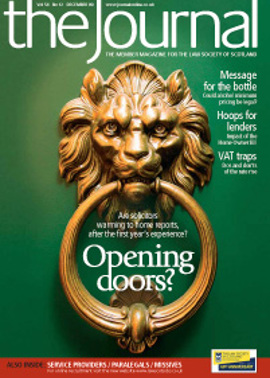A tale for our times

Production values dictate that a publication such as the Journal has a two week advance deadline.
From time to time, however, such a gap between composition and publication has an unfortunate feature. When considering the subject matter of this month’s epistle, and casting around for inspiration, the only suggestion offered was that I “write something festive”. By the time you read this that will be entirely appropriate but, as I prepare it, on the eve of the Feast of St Andrew, Christmas still seems some distance away. Few, if any, halls are for the moment holly bough-bedecked; even where the great Venn diagram with one subset of chestnuts and a second of open fires already intersects, little roasting yet takes place; and the herald angels, far from being in full voice, haven’t even got round to booking the room for their choir practice.
In an attempt to put me in the mood, Wee Mo has brushed 11 months’ dust off my CD of Phil Spector’s Christmas Album and loaded it on my iPod, but even that only prompted me to do a quick internet check on whether Spector ever appealed his murder conviction (hedidn’t), rather than start imagining that Santa Claus’s arrival in town appears truly imminent.
So, what to write? There are traditionally (sic) two possible themes for a piece of this nature. The first involves reflecting on the year past and anticipating the year ahead, but I think I’ll leave that for January. That is surely the Scottish way.
The second involves some short Christmas parable. That’s the one I’m going for.
My favourite Christmas film is Frank Capra’s It’s a Wonderful Life. It is, I should observe, a wholly appropriate choice for an Officer of the Law Society of Scotland. Not only does its plot revolve around a (failed) financial compliance inspection but it features inter alia a dance floor in need of a health and safety audit, a house whose purchase would surely never have been undertaken had it required a home report, and a credit crunch which make our own problems this year appear to be a mere bagatelle. It is, obviously, a sentimental film but in many ways it is not a wholly naive one. George Bailey, the central character, does become an invaluable, loved and respected figure to the town of Bedford Falls but that achievement comes at a price. He never gets to live out his wider dreams of world travel and, at the peak of his career, he clearly enjoys no great measure of personal wealth.
Within our profession, there are countless George Baileys. This year has been dominated by potential ABS changes claimed by the consumer lobby to bring greater competition to the legal services market. I make no apology for being a continued cautious supporter of these changes, but we must be careful not to throw the baby out with the bathwater. High street solicitors provide a daily and invaluable advice service, for which little by way of fees is ever charged. Clients are given one-off advice, by no means all of it strictly legal advice, which nonetheless provides reassurance or guidance of almost unquantifiable benefit to them. Local solicitors also play a key role in bringing and applying their professional skills to the assistance of numerous voluntary organisations: churches, community groups, worthy campaigns and local charities.
In Bedford Falls, George Bailey runs a savings and loan, the US equivalent of a traditional British building society. In the 1980s and 90s the establishment consensus in the USA was that such institutions were inefficient and anachronistic. They had to be opened up to the rigour and opportunity of the market. Without the installation of appropriate safeguards, the result was disastrous. Insufficiently monitored pursuit of profit led to numerous cases of financial collapse and a not insignificant number of straightforward frauds. Millions of innocent savers were placed in danger of personal ruin. Even when federal intervention saved the day, choice, far from being widened as originally intended, was ultimately greatly curtailed. Further, the financial landscape which then remained was the one which itself collapsed so spectacularly over the last two years.
The message of all this is not that change is bad. It is however that the consequences of change need to be thought through, and undesirable consequence anticipated by appropriate regulation. You have my assurance that in the ongoing ABS process, that principle will be at the very forefront of the Society’s deliberations.
So that’s my festive message.
All that remains is for me to wish all of you all a very merry Christmas and a happy and prosperous New Year.
See you in 2010.
In this issue
- Home reports have devastated the Scottish house market
- Review of the Fatal Accident Inquiry Legislation
- The Gill Review: a personal injury practitioner’s perspective
- A tale for our times
- A step too far?
- Report card
- Down the slipway
- Homing instinct
- Bottle for a contest
- Ready for the VAT rise?
- New website to promote training openings
- First solicitor advocates approved as "senior"
- Your feedback
- The very definition of paralegal
- Law reform update
- Lawyers can network too
- Ask Ash
- Welcome, user! (and you're sued)
- Communication, communication, communication
- Keeping the peace
- On the mark?
- Crown disclosure: the next level
- Tackling improvements
- Camera angles
- Cutting red tape in Europe
- Scottish Solicitors' Discipline Tribunal
- Website review
- Book reviews
- Calling the shots
- Sector "rising to challenge": Millar
- "One size" is a dodgy fit
- BSA brings in standard instructions
- A new burden is born






